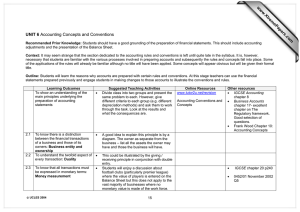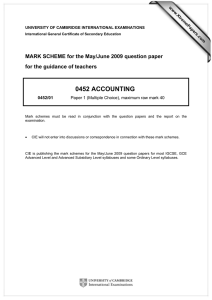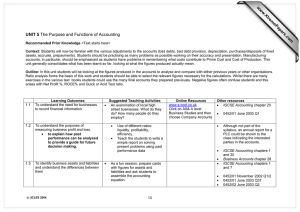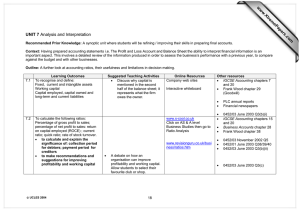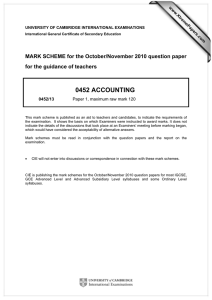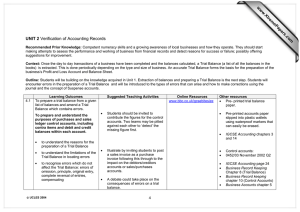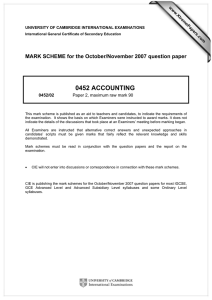www.XtremePapers.com
advertisement
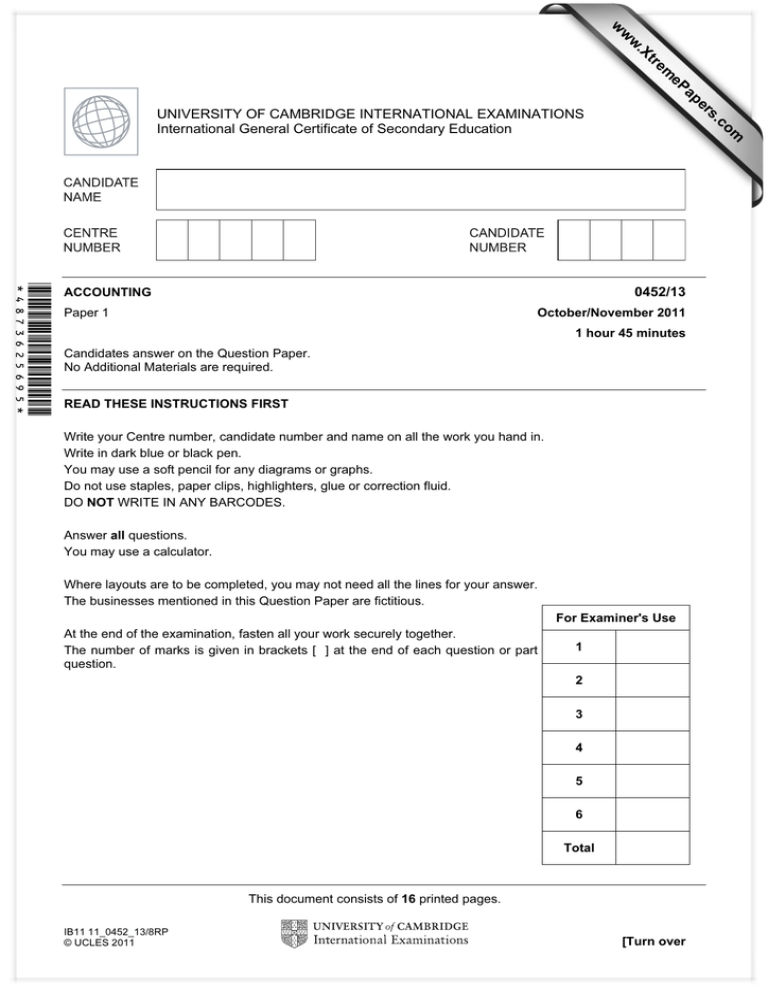
w w ap eP m e tr .X w s er *4873625695* ACCOUNTING om .c UNIVERSITY OF CAMBRIDGE INTERNATIONAL EXAMINATIONS International General Certificate of Secondary Education 0452/13 October/November 2011 Paper 1 1 hour 45 minutes Candidates answer on the Question Paper. No Additional Materials are required. READ THESE INSTRUCTIONS FIRST Write your Centre number, candidate number and name on all the work you hand in. Write in dark blue or black pen. You may use a soft pencil for any diagrams or graphs. Do not use staples, paper clips, highlighters, glue or correction fluid. DO NOT WRITE IN ANY BARCODES. Answer all questions. You may use a calculator. Where layouts are to be completed, you may not need all the lines for your answer. The businesses mentioned in this Question Paper are fictitious. For Examiner's Use At the end of the examination, fasten all your work securely together. The number of marks is given in brackets [ ] at the end of each question or part question. 1 2 3 4 5 6 Total This document consists of 16 printed pages. IB11 11_0452_13/8RP © UCLES 2011 [Turn over 2 1 There are 10 parts to Question 1. For each of the parts (a) to (j) below there are four possible answers A, B, C and D. Choose the one you consider correct and place a tick () in the box to indicate the correct answer. (a) Ali receives a cheque from Hassan, a debtor, in payment for goods purchased by Hassan on credit. Where will Ali enter this payment? A cash book and sales ledger B cash book and purchases ledger C nominal ledger and sales ledger D nominal ledger and purchases ledger [1] (b) Which is part of the double entry system? A petty cash book B purchases journal C sales return journal D trial balance [1] (c) A trader commenced business with a gift of machinery from his father. What will be the accounting entry? debit credit A bank machinery B capital machinery C machinery bank D machinery capital © UCLES 2011 0452/13/O/N/11 [1] For Examiner's Use 3 (d) How would the balances of the carriage inwards and carriage outwards accounts be recorded in the trial balance? carriage inwards carriage outwards A Credit column Debit column B Credit column Credit column C Debit column Debit column D Debit column Credit column For Examiner's Use [1] (e) A bank reconciliation statement is A drawn up by the bank to ensure there is no fraud. B drawn up by the company to verify the cash book balance against the bank statement balance. C sent by the bank every quarter. D sent by the bank when the account is overdrawn. [1] (f) Which is revenue expenditure? A building an extension to factory premises B legal costs of buying factory premises C purchase of factory premises D redecorating factory premises © UCLES 2011 [1] 0452/13/O/N/11 [Turn over 4 (g) The depreciation of equipment for the year was $200. For Examiner's Use Which journal entry records this? Debit $ A B C D Depreciation of equipment Income statement Income statement Provision for depreciation of equipment Provision for depreciation of equipment Depreciation of equipment Provision for depreciation of equipment Income statement Credit $ 200 200 200 200 200 200 200 200 [1] (h) Which is shown in a statement of affairs? A gross profit B overhead expenses C owner’s capital D sales and purchases [1] (i) Which is a measure of profitability? A current ratio B quick ratio C rate of inventory turnover D return on capital employed [1] (j) What is meant by duality? A for every entry in the cash book there must be a corresponding entry in the bank statement B for every debtor there must be a creditor C there are two aspects to every transaction D there are two sides to every balance sheet [1] [Total: 10] © UCLES 2011 0452/13/O/N/11 5 2 (a) Give two examples of a financial statement (final account). For Examiner's Use (i) (ii) [2] (b) (i) Explain what is meant by a service business. [1] (ii) Give one example of a service business. [1] (c) In the table below, place a tick () under the correct heading to show whether the item is an asset or a liability. Asset Liability Trade payables Goodwill Bank overdraft [3] (d) Give two reasons for depreciating non-current assets. (i) (ii) [2] (e) Name one interested party who makes use of accounting information. [1] © UCLES 2011 0452/13/O/N/11 [Turn over 6 (f) Explain what is meant by the accounting principle of going concern. For Examiner's Use [1] (g) Complete the following statement: inventory is valued at the lower of and [2] (h) Jaime had revenue (sales) for the year ended 30 September 2011 of $36 000. He uses a standard mark-up of 25%. Calculate Jaime’s cost of sales for the year. Show all your workings. [4] (i) Samra Limited has issued $120 000 of 5% debentures which are repayable in 2016. The debenture interest is payable quarterly. State the amount of interest payable by the company each quarter. [3] [Total: 20] © UCLES 2011 0452/13/O/N/11 7 3 Briscow has a hardware business and buys inventory on credit. He receives purchase invoices from his suppliers. For Examiner's Use REQUIRED (a) Name the book of prime (original) entry in which Briscow will enter his purchase invoices. [1] (b) Briscow has received a purchase invoice from a supplier. Certain items are missing from the invoice but it is possible to complete the missing items from the other information. Complete the missing items (words or figures) (i) to (vii) on the supplier’s invoice. Global Supply Company Sales Invoice Briscow 15 September 2011 Quantity Description Unit price $ Total $ 100 Fastenings 2.50 250.00 250 Long screws 1000 50 (ii) 500 (i) 112.50 Boltheads 0.75 750.00 Wall fixings 3.00 150.00 Angles 2.80 210.00 Wood nails 0.30 150.00 (iii) Less % (iv) discount (v) (vi) Total Terms: 2 ½ % 1557.60 discount for payment within 14 days of invoice (vii) [7] © UCLES 2011 0452/13/O/N/11 [Turn over 8 Briscow’s accounting records for the year ended 30 September 2011 showed the following: Purchases Purchases returns Trade payables at 1 October 2010 Trade payables at 30 September 2011 Inventory at 1 October 2010 Inventory at 30 September 2011 $ 73 400 800 7 000 8 000 7 600 9 000 REQUIRED (c) Calculate Briscow’s payment period for trade payables in days. Show your workings and round your answer up to the next whole day. [4] (d) Calculate Briscow’s rate of inventory turnover. Show your workings and give your answer to two decimal places or the nearest whole day. [4] (e) Briscow proposes to reduce the amount of his trade payables and to reduce the average amount of his inventory. For each of these changes, place a tick () under the correct heading to show whether the change will increase, decrease, or have no effect on the accounting ratio shown. (i) Effect if Briscow reduces the amount of trade payables. Increase Decrease No effect Payment period for trade payables Rate of inventory turnover [4] (ii) Effect if Briscow reduces the average amount of inventory. Increase Decrease No effect Payment period for trade payables Rate of inventory turnover [4] [Total: 24] © UCLES 2011 0452/13/O/N/11 For Examiner's Use 9 4 Adrian and Christopher are in partnership. Their partnership agreement includes the following: 1 Interest on partners’ capital is allowed at 4% per annum. 2 Christopher is to receive a salary of $18 000 per annum. 3 Interest is to be charged at 6% per annum on the excess of drawings over $12 000 per annum (for a whole year whenever drawn) 4 The balance of profits or losses is to be shared by Adrian and Christopher in the ratio 5:3. For Examiner's Use The profit of the partnership for the year ended 31 August 2011 was $93 000. Additional information: Adrian Christopher Drawings for the year ended 31 August 2011 $ 32 000 12 000 Capital account at 1 September 2010 $ 40 000 50 000 REQUIRED (a) Explain the purpose of a partnership appropriation account. [2] (b) Prepare Adrian and Christopher’s appropriation account for the year ended 31 August 2011. You may use the space below for workings. © UCLES 2011 0452/13/O/N/11 [Turn over 10 Adrian and Christopher Appropriation Account for the year ended 31 August 2011 For Examiner's Use [14] © UCLES 2011 0452/13/O/N/11 11 The balances on the partners’ current accounts at 1 September 2010 were: Adrian Christopher For Examiner's Use $ 3400 Cr 9000 Cr REQUIRED (c) From this information, and the appropriation account write up each partner’s current account for the year ended 31 August 2011. Show the balance brought down on each account at 1 September 2011. [12] [Total: 28] © UCLES 2011 0452/13/O/N/11 [Turn over 12 5 Ruth has an office services business. Her financial year ends on 30 September. On 1 October 2008 she bought office furniture costing $1800 for use in her business and paid by bank transfer. Ruth has been depreciating the furniture on the reducing balance method at the rate of 40% per annum. On 1 October 2010 the balance on her provision for depreciation of office furniture account was $1152. On 1 April 2011 Ruth sold all the office furniture to Norse Limited for $850. She entered this amount in her cash book and at the end of the month transferred it to her sales account. REQUIRED (a) Name the account to which the sale proceeds of the office furniture should have been transferred. [2] (b) State the type of error which Ruth has made. [2] (c) Show the journal entry required to correct this error. The date and narrative are not required. Dr Cr $ $ [4] © UCLES 2011 0452/13/O/N/11 For Examiner's Use 13 Ruth is preparing her financial statements for the year ended 30 September 2011 and is writing up her ledger accounts to show the sale of the furniture correctly. For Examiner's Use No depreciation is to be provided on items sold in the year. REQUIRED (d) Make the entries in Ruth’s ledger accounts and show any transfer to her income statement for the year. Ruth Office furniture account Provision for depreciation of office furniture account Disposal of office furniture account [8] © UCLES 2011 0452/13/O/N/11 [Turn over 14 (e) Ruth does not understand why there is a transfer to her income statement from the disposal of office furniture account. (i) Explain what the transfer to Ruth’s income statement represents. [2] (ii) Suggest one way in which Ruth may reduce or avoid such transfers on the future sale of other non-current assets. [2] [Total: 20] 6 Lo Shung Limited sells business stationery and their financial year ends on 30 September. After preparing the income statement for the year ended 30 September 2011 the trial balance showed the following items. Equipment Provision for depreciation Inventory (30 September 2011) Trade receivables Bank and cash Trade payables Other payables 3% debentures repayable 2020 Share capital Retained profit brought forward Profit for the year $ 18 500 9 800 4 500 8 700 1 000 Dr 5 800 900 6 000 5 000 1 200 4 000 REQUIRED (a) Prepare Lo Shung Limited’s statement of financial position (balance sheet) at 30 September 2011 on the following page. © UCLES 2011 0452/13/O/N/11 For Examiner's Use 15 Lo Shung Limited Statement of Financial Position (Balance Sheet) at 30 September 2011 For Examiner's Use [11] © UCLES 2011 0452/13/O/N/11 [Turn over 16 The management of Lo Shung Limited are interested in measuring their company’s performance. For Examiner's Use REQUIRED (b) In the table below, place a tick () under the correct heading to show whether the accounting ratio measures profitability or liquidity. Profitability Liquidity Percentage of profit for the year to sales Current ratio Return on capital employed [3] (c) From the information above and your answer to (a), calculate the return on opening capital employed for Lo Shung Limited. Show your workings and give your answer to two decimal places. [4] [Total: 18] Permission to reproduce items where third-party owned material protected by copyright is included has been sought and cleared where possible. Every reasonable effort has been made by the publisher (UCLES) to trace copyright holders, but if any items requiring clearance have unwittingly been included, the publisher will be pleased to make amends at the earliest possible opportunity. University of Cambridge International Examinations is part of the Cambridge Assessment Group. Cambridge Assessment is the brand name of University of Cambridge Local Examinations Syndicate (UCLES), which is itself a department of the University of Cambridge. © UCLES 2011 0452/13/O/N/11
